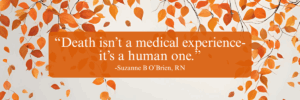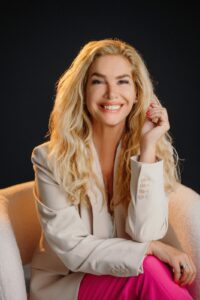
Death is a universal experience, yet many people today arrive at the end of life unprepared – emotionally, practically, and spiritually. Over the past century, dying has gradually moved from the comfort of home into hospitals and other medical institutions. While advances in medicine have extended life, they’ve also contributed to a growing sense of detachment from the natural process of dying. Many of us find ourselves thrust into the role of caregiver without any prior training or experience, and as a result, often feel uncertain, isolated, and overwhelmed when the time comes.
This detachment has real consequences. What was once shared communal knowledge, how to be present, how to offer comfort, how to navigate the final stages of life, has been largely lost. This loss affects not only those who are dying, but also the loved ones who are actively grieving while trying to provide care without a clear sense of what is happening or how to help.
In response to this gap, a cultural shift began to take shape. In 2011, mortician and author Caitlin Doughty founded The Order of the Good Death, helping to spark what is now widely referred to as the Death Positive Movement. Doughty and others began speaking publicly about the importance of bringing death back into the conversation-removing stigma, encouraging curiosity, and advocating for practices that make death more visible, participatory, and humane.
One initiative contributing to this movement is led by Suzanne B. O’Brien, RN, a former hospice and oncology nurse. The Good Death Movement, which shares this philosophy, focuses on restoring caregiving knowledge and encouraging open dialogue around dying. It invites us to reimagine what it means to die well, not just in terms of medical decisions, but in how we show up for one another with love and practical support. At its heart, the movement is about reclaiming death as a natural part of life, something to be approached with dignity, presence, and care.

Drawing on her experience at the bedside of over a thousand patients, Suzanne has developed free, community-based education for end-of-life caregiving. Her Doulagivers Level 1 End of Life Doula Family Caregiver Training is a 90-minute online course designed to equip families, friends, and community members with essential tools to support someone through the dying process. The training is open to all and has been translated into 15 languages.
People who have taken the training describe it as deeply clarifying and empowering. One retired nurse with decades of experience in oncology and palliative care called it “The best 90 minutes of clear, comprehensive education on end-of-life care I have ever heard.”
This kind of accessible education is central to a broader cultural shift: one in which dying is not something to be hidden or feared, but something we can prepare for, talk about, and meet with intention and love.
In addition to her training programs, Suzanne has written the international bestseller The Good Death: A Guide for Supporting Your Loved One Through the End of Life. The book offers step-by-step guidance for caregivers, with practical tools for navigating the emotional, physical, and spiritual aspects of dying. It’s part of a larger effort to demystify the process and empower people to approach death with compassion and clarity.
Together, these efforts form part of a broader cultural realignment. As more people begin to talk openly about death, share caregiving knowledge, and advocate for better end-of-life practices, the way we live, and die, can begin to shift too.
Death may be inevitable, but how we meet it, and how we support one another through it, is something we can reclaim with dignity, open dialogue, and love.
Further Resources:
- Explore free caregiver education: Doulagivers Free Resource Page
- Register for the monthly Good Death Book Club Experience (second Thursday of each month at 1:00 PM ET): Book Club Registration
- Access the free Level 1 End of Life Doula Family Caregiver Training (in 15 languages): Watch the Training























































